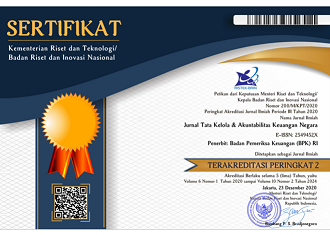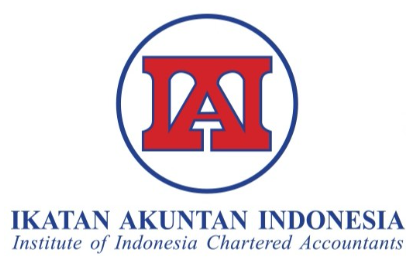Rent-Seeking, Political Budget Cycle, and Audit Opinion: An Analysis of Local Government Spending in Indonesia
Keywords:
Rent-seeking, local government, election, incumbency, budget cycles, audit opinion, local revenue, unconditional transferAbstract
Rent-seeking behavior is one factor associated with the poor performance of local governments in Indonesia. It is an opportunistic behavior that often occurs in the government's budget allocating process. This study aims to estimate rent-seeking size in regional governments in Indonesia based on Katz and Rosenberg's (1989) method. The determining factors used are the availability of resources and political events. In addition, as an expected control mechanism that may dampen rent-seeking size, auditing is introduced. Using the Generalized Least Square Regression method, this study employs a cross-section time-series panel dataset of 305 local governments from 2015 to 2019. There were three findings in this study: (1) there was a decreasing trend in rent-seeking size after the national election was held in 2014-2015; (2) local governments that held elections showed a tendency to have a higher degree of rent-seeking, especially when the current executives or "incumbents" were standing for election; and (3) local governments that received 'Unqualified Opinion' for their financial statements had a smaller size and allocations of the rents. Those might suggest that auditing was an effective governance mechanism to restrain opportunistic rent-seeking behavior.
References
Adiputra, I. M. P., Utama, S., & Rossieta, H. (2018). Transparency of local government in Indonesia. Asian Journal of Accounting Research, 3(1), 123–138. DOI: 10.1108/AJAR-07-2018-0019
Alesina, A., & Perotti, R. (1996). Fiscal adjustments in OECD countries: Composition and macroeconomic effects (NBER Working Papers, Issue 5730). National Bureau of Economic Research, Inc.
Berry, W. D., & Feldman, S. (1994). Multiple regression in practice. In Sage University Paper Series. Quantitative Application in the Social Sciences. Sage Publication. Inc.
Bhattacharyya, S., & Hodler, R. (2010). Natural resources, democracy, and corruption. European Economic Review, 54(4), 608–621. DOI: 10.1016/j.euroecorev.2009.10.004
Bierschenk, T., & de Sardan, J. P. O. (2003). Powers in the village: Rural Benin between democratization and decentralization. Africa, 73(2), 145–173. DOI: 10.3366/afr.2003.73.2.145
Blais, A., & Nadeau, R. (1992). The electoral budget cycle. Public Choice, 74, 389-473. DOI: 10.1007/BF00137686
BPK RI. (2020). Summary of Semester Audit Results I Year 2020 (Ikhtisar Hasil Pemeriksaan Semester, IHPS I Tahun 2020). Retrieved from https://www.bpk.go.id/ihps
Brennan, G., & Buchanan, J. (1980). The power to tax. New York: Cambridge University Press.
Cheshire, P., & Gordon, I. (1998). Territorial competition: Some lessons for policy. Annals of Regional Science - ANN REG SCI, 32, 321–346. DOI: 10.1007/s001680050077
Del Rosal, I. (2011). The empirical measurement of rent-seeking costs. Journal of Economic Surveys, 25(2), 298–325. DOI: 10.1111/j.1467-6419.2009.00621.x
Delavallade, C. (2006). Corruption and distribution of public spending in developing countries. Journal of Economics and Finance, 30(2), 222–239. DOI: 10.1007/BF02761488
DiRienzo, C. E., Das, J., Cort, K. T., & Burbridge, J. (2007). Corruption and the role of information. Journal of International Business Studies, 38(2), 320–332.
Djankov, S., Porta, R. La, Lopez-de_Silanes, F., & Shleifer, A. (2008). Transparency and accountability. In EDHEC Risk and Asset Management Research Centre (Issue 1). DOI: 10.7208/Chicago/9780226261881.003.0008
Drazen, A., & Eslava, M. (2010). Electoral manipulation via voter-friendly spending: Theory and evidence. Journal of Development Economics, 92(1), 39–52. DOI: 10.1016/j.jdeveco.2009.01.001
Duflo, E., Fischer, G., & Chattopadhyay, R. (2005). Efficiency and rent-seeking in local government: Evidence from randomized policy experiments in India. Retrieved from https://www.povertyactionlab.org/sites/default/files/research-paper/107_Duflo _Efficiency_and_Rent_Seeking.pdf
Faguet, J. P. (2004). Does decentralization increase government responsiveness to local needs? Evidence from Bolivia. Journal of Public Economics, 88(3–4), 867–893. DOI: 10.1016/S0047-2727(02)00185-8
Ferraz, C., & Finan, F. (2005). Reelection incentives and political corruption: Evidence from Brazilian audit reports. American Agricultural Economics Association Annual Meeting, January, 1–41.
Ghozali, I., & Khoirunurrofik. (2020). Fiscal decentralization and capital expenditure composition of regional government in Indonesia. International Journal of Trade and Global Markets, 13(1), 81–88. DOI: 10.1504/IJTGM.2020.104909
Hill, H., & Vidyattama, Y. (2016). Regional development dynamics in Indonesia before and after the “Big Bang” decentralization. Singapore Economic Review, 61(2). DOI: 10.1142/S0217590816400270
Hillman, A. (2013). Rent-seeking. In M. Reksulak, L. Razzolini, & W. Shughart II (Eds.), The Elgar Companion to Public Choice, (pp. 307–330). Cheltenham, UK: Edward Elgar. DOI: 10.4337/9781849802857.00032
Hillman, A. L., & Long, N. Van. (2019). Rent-seeking: The social cost of contestable benefits. The Oxford Handbook of Public Choice, 1, 489–518.
Katz, E., & Rosenberg, J. (1989). Rent-seeking for budgetary allocation: Preliminary results for 20 countries. Public Choice, 60(2), 133–144. DOI: 10.1007/BF00149241
Khan, M. H., & Sundaram, J. K. (2000). Rent-seeking as process. In Rents, Rent-Seeking and Economic Development: Theory and Evidence in Asia (pp. 70–144). Cambridge University Press. DOI: 10.1017/cbo9781139085052.003
Krueger, A. O. (1974). The political economy of the rent-seeking society. The American Economic Review, 64(3), 291–303.
Mauro, P. (1998). Corruption and the composition of government expenditure. Journal of Public Economics, 69(2), 263–279. DOI: 10.1016/S0047-2727(98)00025-5
McLeod, R. (2005). The struggle to regain effective government under democracy in Indonesia. Bulletin of Indonesian Economic Studies, 41(3), 367–386.
Mietzner, M. (2013). Funding pilkada: Illegal campaign financing in Indonesia’s local elections. In The State and Illegality in Indonesia (pp. 123-138). Leiden, The Netherlands: Brill. DOI: 10.1163/9789004253681_008
Oates, W. (1993). Fiscal decentralization and economic development. National Tax Journal, 46(2), 237–243.
Olken, B. A. (2007). Monitoring corruption: Evidence from a field experiment in Indonesia. Journal of Political Economy, 115(2), 200–249. DOI: 10.1086/517935
Park, M. J. (2007). Rent-seeking in Korean government budget allocation. International Review of Public Administration, 12(2), 33–44. DOI: 10.1080/12294659.2008.10805103
Pina, V., Torres, L., & Royo, S. (2010). Is e-government promoting convergence towards more accountable local governments? International Public Management Journal, 13(4), 350–380. DOI: 10.1080/10967494.2010.524834
Platzdasch, B. (2011). Localizing power in post-authoritarian Indonesia: A Southeast Asia perspective. Journal of Contemporary Asia, 41(3), 508–510. DOI: 10.1080/00472336.2011.582786
Rodríguez-Pose, A., & Ezcurra, R. (2010). Does decentralization matter for regional disparities? A cross-country analysis. Journal of Economic Geography, 10(5), 619–644. DOI: 10.1093/jeg/lbp049
Rogoff, K., & Sibert, A. (1988). Elections and macroeconomic policy cycles. The Review of Economic Studies, 55(1), 1-16. DOI: 10.2307/2297526
Schnytzer, A. (1994). Changes in budgetary allocations and international comparisons of the social cost of rent-seeking: A critical note. Public Choice, 79(3–4), 357–362. DOI: 10.1007/BF01047779
Sjahrir, B. S., Kis-Katos, K., & Schulze, G. G. (2013). Political budget cycles in Indonesia at the district level. Economics Letters, 120(2), 342-345. DOI: 10.1016/j.econlet.2013.05.007
Sjahrir, B. S., Kis-Katos, K., & Schulze, G. G. (2014). Administrative overspending in Indonesian districts: The role of local politics. World Development, 59, 166-183. DOI: 10.1016/j.worlddev.2014.01.008
Skoufias, E., Bank, W., Narayan, A., Bank, W., Dasgupta, B., Kaiser, K., & Bank, W. (2011). Electoral accountability, fiscal decentralization, and service delivery in Indonesia. Policy Research working paper; no. WPS 5614. World Bank. Retrieved from https://openknowledge.worldbank.org/handle/10986/3381
Stansel, D. (2005). Local decentralization and local economic growth: A cross-sectional examination of US metropolitan areas. Journal of Urban Economics, 57(1), 55–72. DOI: 10.1016/j.jue.2004.08.002
Tanzi, V., & Davoodi, H. R. (1997). Corruption, public investment, and growth. IMF Working Papers, 97(139). DOI: 10.5089/9781451929515.001
Tanzi, V., & Davoodi, H. R. (2000). Corruption, growth, and public finances. IMF Working Papers 00(182), 1. DOI: 10.5089/9781451859256.001
Vicente, C., Benito, B., & Bastida, F. (2013). Transparency and political budget cycles at the municipal level. Swiss Political Science Review, 19(2), 139-156. DOI: 10.1111/spsr.12036
Xie, D., Zou, H., & Davoodi, H. (1999). Fiscal decentralization and economic growth in the United States. Journal of Urban Economics, 45, 228–239. DOI: 10.1080/00036840903427208
Zhang, X. (2006). Fiscal decentralization and political centralization in China: Implications for growth and inequality. Journal of Comparative Economics, 34(4), 713–726. DOI: 10.1016/j.jce.2006.08.006
Downloads
Submitted
Accepted
Published
How to Cite
Issue
Section
License

Jurnal Tata Kelola dan Akuntabilitas Keuangan Negara is licensed under
a Creative Commons Attribution-ShareAlike 4.0 International License




















